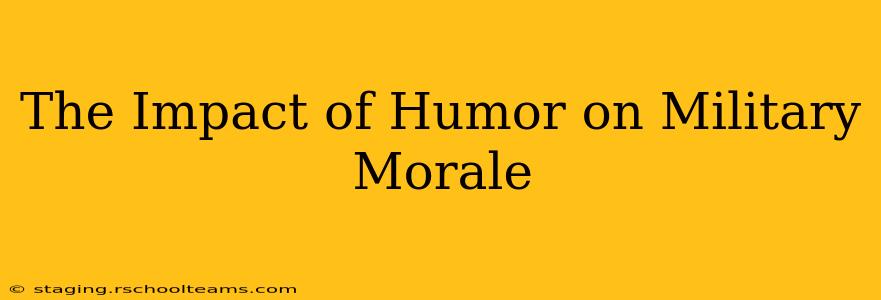Humor, often overlooked in discussions of military readiness, plays a surprisingly significant role in maintaining morale and fostering resilience within armed forces. From battlefield banter to comedic relief during downtime, laughter serves as a powerful coping mechanism and a crucial element of unit cohesion. This exploration delves into the multifaceted impact of humor on military morale, examining its benefits and the challenges associated with its appropriate application.
How Does Humor Affect Military Morale?
Humor acts as a potent buffer against the intense stress and trauma inherent in military life. Facing life-threatening situations, enduring long deployments, and grappling with the emotional toll of combat can lead to burnout, depression, and PTSD. Laughter, however, provides a much-needed emotional release, temporarily shifting focus away from anxieties and fostering a sense of normalcy. It allows individuals to process difficult experiences in a healthier way, reducing feelings of isolation and helplessness.
Furthermore, shared humor builds camaraderie and strengthens unit cohesion. Inside jokes, playful teasing, and collaborative storytelling create a sense of belonging and mutual understanding amongst soldiers. This shared experience transcends the hierarchical structures of the military, fostering a more egalitarian and supportive environment. A strong sense of unit cohesion directly translates to improved performance, cooperation, and overall morale.
What Are the Benefits of Using Humor in the Military?
The benefits extend beyond individual well-being; humor contributes significantly to operational effectiveness. A positive and supportive atmosphere, fostered in part by humor, encourages open communication, creative problem-solving, and a willingness to take calculated risks. Soldiers who feel comfortable and supported are more likely to perform at their best, displaying increased adaptability and resilience in the face of challenges.
Increased Resilience: Humor helps soldiers cope with stress, trauma, and the psychological demands of military service. It acts as a protective factor against the development of mental health issues.
Improved Teamwork and Cohesion: Shared laughter creates bonds and fosters a sense of community, enhancing collaboration and trust within units.
Enhanced Communication: A relaxed and less formal atmosphere, promoted by humor, encourages open communication and the sharing of concerns and ideas.
Reduced Stress and Anxiety: Humor provides a temporary escape from stressful situations, allowing soldiers to manage their emotional well-being.
What Are the Challenges and Risks Associated with Humor in a Military Context?
While humor's benefits are undeniable, its implementation requires careful consideration. Inappropriate jokes or insensitive humor can easily undermine morale, create divisions, and even damage trust within a unit. Humor that targets race, religion, gender, or sexual orientation is completely unacceptable and can have devastating consequences. Furthermore, excessive reliance on humor to mask deeper issues can prevent individuals from seeking necessary support for mental health challenges.
Maintaining Professionalism: Humor must always be balanced with the maintenance of professionalism and discipline.
Avoiding Offense: Sensitivity to the diverse backgrounds and experiences within a military unit is crucial to prevent unintended harm.
Appropriate Context: The timing and context of humor are crucial. What might be appropriate in a relaxed setting may be inappropriate during a high-stress situation.
Is Humor Training Necessary for Military Personnel?
The question of whether or not humor training is necessary is complex. While not every soldier needs formal training in comedic delivery, education on the importance of appropriate humor and its potential impact on morale and cohesion is valuable. This training could focus on building empathy, fostering inclusivity, and promoting respectful communication, ensuring that humor is used constructively and never as a tool for bullying or harassment. Moreover, it's essential to encourage the healthy use of humor as a coping mechanism to mitigate stress, alongside other established mental health support systems.
What are the best types of humor for boosting military morale?
The most effective humor in a military setting is often self-deprecating, observational, or situational. Jokes that highlight shared experiences, common challenges, or the absurdities of military life are typically well-received. Avoid politically charged or offensive humor. The goal is to foster connection and release tension, not to alienate or offend.
How can leaders use humor effectively to improve morale?
Military leaders can utilize humor strategically to create a more positive and supportive environment. Leading by example and demonstrating a sense of humor, without compromising professionalism, can greatly enhance morale. Sharing personal anecdotes, using lighthearted language where appropriate, and encouraging playful banter within the team can foster a stronger sense of camaraderie.
In conclusion, the strategic and mindful use of humor can profoundly enhance military morale, promoting resilience, strengthening unit cohesion, and ultimately, improving operational effectiveness. However, responsible implementation, emphasizing inclusivity and avoiding harmful stereotypes, is crucial to reaping the full benefits of this often-underestimated asset.
